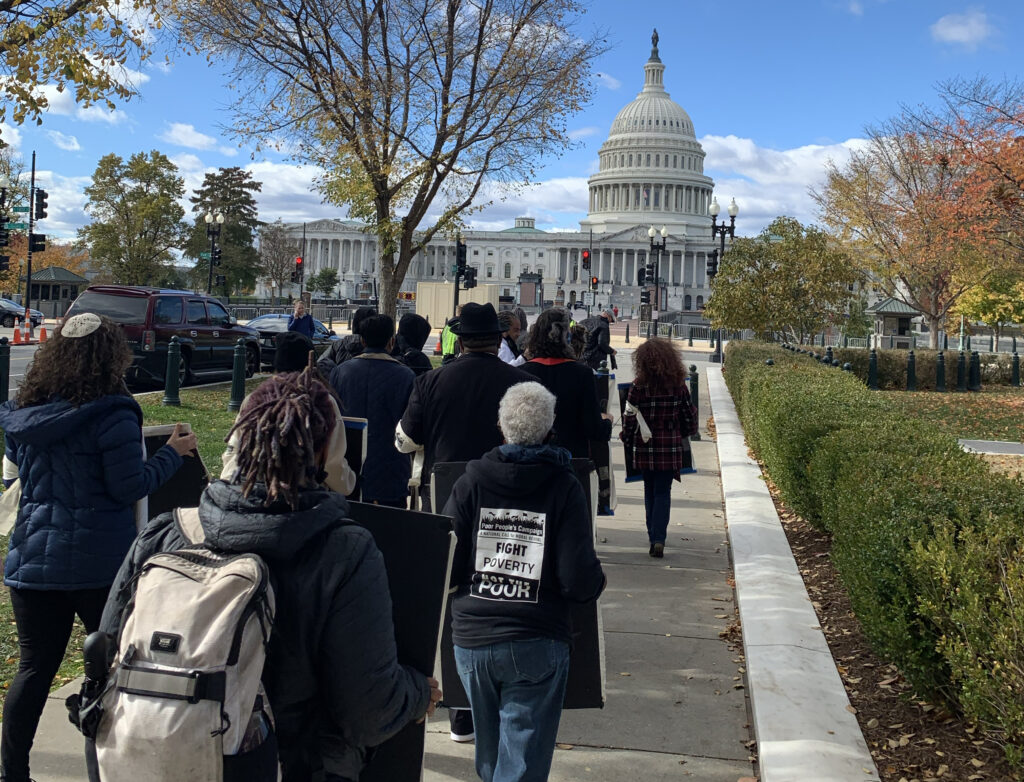The first 100 days of a new Presidential administration are key to establishing priorities, confirming personnel, and advancing a political agenda before encountering headwinds.
In January 2025, as a far-right trifecta (House, Senate, Presidential administration) takes office, we expect the first 100 days to be a deluge of attacks on a just and livable future. Those newly in power will aim to dismantle progress on climate action and pursue an aggressive agenda to “drill, baby, drill,” and extract and burn more fossil fuels.
At Dayenu, we are watching closely and will continue to identify opportunities to protect hard-earned progress at every level of government.
It’s easy to get overwhelmed, but we know that our history of perseverance, our shared commitment to a livable future, and our collective people power will sustain us even in the darkest of times.
The 119th Congress takes office January 3
President Trump’s first 100 days essentially begin when the new Congress takes office – and energy is on the agenda.
Congressman Steve Scaliese (R-LA) notes, “We will unleash American energy by mandating lease sales, opening federal lands to increased energy exploration and production, and repealing harmful slush funds and policies Democrats jammed through in their so-called ‘Inflation Reduction Act’.”
Executive Nominations. The Senate will dedicate its early days to confirming President Trump’s executive nominations. Despite their lack of experience and/or antagonism to their agencies’ mandates, nominees for key climate and environment posts are not considered controversial and likely to be easily confirmed.
- EPA: Lee Zeldin
- Energy: Chris Wright
- Interior & “Energy Czar:” Doug Burgum
- Transportation: Sean Duffy
- Agriculture: Brooke Rollins
It remains to be seen if Trump will appoint heads to the Council on Environmental Quality (CEQ) and/ or the National Oceanic and Atmospheric Administration (NOAA), as he’s indicated a desire to eliminate both.
Congressional Review Act (CRA). Under the CRA, Congress can overturn recent executive actions with a simple majority vote. Two pertinent pollution rules are at risk: limits to lead and copper in drinking water, and a fee on fossil fuel companies that release the super-pollutant methane (learn more in this backgrounder).
Budget reconciliation. Not to be confused with the annual federal budget, Congress must also pass a budget law to set the parameters for annual spending. Unlike most legislation (which in today’s hyper-partisan environment needs a 60-vote Senate supermajority to pass), budget bills only require a simple majority. As such, budget reconciliation has become a favored vehicle for passing substantive legislation. The catch: provisions in the budget bill can only pertain to taxing or spending.
Incoming Republican leadership plans to pursue budget reconciliation to pass a myriad of priorities in its early days. However, Republicans claim they will not approve any new spending without commensurate cuts or tax increases.
Any reconciliation bill could include cuts to unspent Inflation Reduction Act grants and/or Republicans’ least favorite tax credits:
- Ending or constraining the $7,500 EV tax credit.
- Overturning the methane fee.
- Ending wind subsidies (for no real reason other than Trump just doesn’t like wind).
It’s increasingly unlikely, though not guaranteed, that Republican Congressional leaders will pursue a wholesale repeal of the Inflation Reduction Act. This decision is as much a result of Republican districts benefiting from the law as the slim House margin, and the potential for infighting.
The incoming TRUMP ADMINISTRATION
Trump has promised to make energy a Day 1 priority; we should be prepared for a barrage of announcements soon after the Inauguration. (Helpful resources: “12 big changes Trump could make to climate and environment policy” and Trump’s first-term playbook.)
Likely actions in the first 100 days
Withdraw from the Paris climate agreement by filing a notice of intent with the United Nations.
Issue an energy-focused executive order within the few weeks, likely to:
- End the pause on permitting new natural gas export terminals. This move will be particularly devastating to the Gulf Coast, where six of these projects are sited.
- Overturn drilling bans on federal lands and in federal waters, expected to include parts of the Arctic National Wildlife Refuge, National Petroleum Reserve in Alaska, coastal waters, and areas formerly protected as National Monuments in Utah.
- Pause and initiate repeal of carbon pollution standards for existing coal- and new gas-fired power plants.
- Pause and initiate repeal of rules to limit vehicle emissions, tailpipe emissions, and fuel efficiency standards.
Revoke environmental justice processes and productions. Most of the Biden Administration’s environmental justice policies and programs were created through executive order, and are expected to be overturned:
- End the Justice40 Initiative, which directs 40 percent of new federal funds to underserved communities.
- Eliminate the White House Environmental Justice Advisory Council (WHEJC).
- Eliminate EPA and CEQ’s offices of environmental justice.
Attack the Inflation Reduction Act. President Trump is likely to claim he repealed the IRA, but since it’s a law, only Congress can do so. We should expect the Administration to take actions that undermine the law, including:
- Direct agencies to claw back unused funds Direct the Treasury Department to tighten rules around which electric vehicles, projects, and companies qualify for tax credits so they are harder to obtain.
More executive actions
Levy higher tariffs on solar panels, electric vehicle batteries, and/or other clean technology. Since the U.S. does not yet have sufficient domestic manufacturing, raising tariffs would drive up prices and significantly hamper clean energy deployment.
Remove federal records and research from the public domain. As you may recall, the first Trump Administration scrubbed the word “climate change” from official documents.
Deprioritize climate science and restructure or eliminate federal agencies and advisory councils that advance climate science and solutions.
Gut the EPA. Ideas that are being floated: eliminating any and all pollution enforcement offices, purging expert staffers and replacing them with political appointees, relocating regional offices, or moving the headquarters out of Washington.
Pause and initiate repeal of additional pollution standards, issued by the EPA.
Revoke California’s waivers to set stronger air pollution standards than the federal standards. The Biden Administration’s EPA granted eight waivers to California, which most Democrat state trifectas are expected to adopt.
Direct the Interior Department to pause permitting new projects and/ or selling new offshore wind leases. Offshore wind is critical to northeastern states meeting their climate goals, and it’s reliant on federal approvals. Unfortunately, it’s personal for Trump.
Despite these potential setbacks at the federal level, Dayenu remains committed to taking bold political action with spiritual audacity. Join us!


Dahlia Rockowitz
Dahlia Rockowitz, Dayenu's Director of Campaigns & Partnership, believes in the power of everyday people to demand and win inclusive, equitable, and ambitious climate solutions. She previously worked in both the climate and Jewish social justice movements, planning activist trainings for thousands of committed volunteers around the world at The Climate Reality Project and advocating to the US government in support of human rights and climate justice worldwide at American Jewish World Service. Dahlia studied environmental justice and policy at the University of Michigan.

